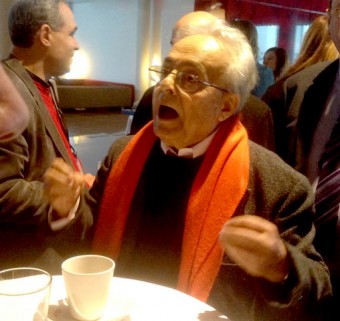لاجئون؟ لا – الناقد السوري كمال أبو ديب
Posted in Miscellaneous,Philosophy,Poetry,Politics,Readings,WritingsSeptember 27, 2015
نص كتبه الناقد السوري الدكتور كمال أبو ديب بتاريخ 26 أيلول 2015
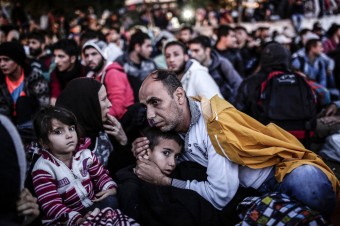
Posted in Miscellaneous,Philosophy,Poetry,Politics,Readings,WritingsSeptember 27, 2015
نص كتبه الناقد السوري الدكتور كمال أبو ديب بتاريخ 26 أيلول 2015

Kamal Abu-Deeb wrote this piece in Arabic few days ago; this is a rough translation of it in the hope that if you are in sympathy with his feelings you may be willing to make this piece available to as many people as you can.
REFUGEES?
NO
————————————–
Refugees?
No.
Do not smear them with the word.
For they are Syrians.
And seeking refuge is not worthy of Syrians.
Throughout their history they have never sought refuge, but have always given refuge.They were, and still are, amongst the most proud, dignified and generous peoples on Earth:
Virtues they have inherited from ancient, deeply steeped roots in history that initiated the history of civilization
In a land that is the flowerbed in which civilized being burgeoned and bloomed,
And in Damascus: the city that began in the labyrinths of the beginning
And shines still, being the only continuously inhabited city in the world
In which the glow and creativity of wo/man have never been extinguished throughout TIME.
Refugees?No.
They are the ones fleeing death.
The ones who survived the blades of the guillotine
Fleeing with their children and pride and women from the brutalities of being skinned after being slaughtered
And being scattered as dismembered limbs crashing into each other in the screaming of bombs.
"Here is a mother who left behind one wounded child in order to save two other children,And young girls who had been shattered by the terror of rape as much as by the terror of torture, neck chopping and deathAll piercing the wilderness with the strength of a blade of a sword.
And amongst the crowding, crashing shoulders, heads and backpacks here is “Nadia”, at 16, disabled, pushing, with her slender hands, her wheelchair over dismembered limbs, destruction of ruins, stones and pools of mud, from Idlib to Zagreb.
And over her lips flutters a smile of the joy of adventure .
Because she had been in a boat and train for the first time in her life,
Beating now at the gates of Austria, in total certainty and faith that she will reach an oasis of safety, shouting:“
"Who submits to catastrophes perishes.”
And we shall not perish.”
Refugees?No.
Do not pour fire into the wounds and call them “ Refugees.”
They have outrun death and crossed in their great despair and the wonder of their mythical patience and endurance, seas and deserts, and trotted through the wilderness, going astray, in order to salvage the life that they witnessed being slaughtered and skinned and roasted and gobbled in Syria.
And they have endured for four years the volcanoes of death before they goning, chasing the horizons and the tracing every line in the map of Europe which cared not a bit for their tragedies until their faces, in their thousands, covered with sun and soil, loomed on its borders and thus became a burden on its affluent life and dying conscious.
Oh, yes,
They are the ones fleeing death.
For their sake, let us turn Facebook, and every other place we can, into a platform for an international campaign, demanding that the countries which close the doors of escape from death in their face realize that by doing so they are closing the doors in the face of the spirit of humanity and sympathy in human beings and stabbing the spirit of charity, love and noble values of the Christianity to which they claim to belong, and claim to have built their civilization on its pillars and moral values.
Let us tell these countries too that by doing so they stab this noble spirit in the very souls of their own citizens, and let us demand of them that they remember that most of them once lived through the horrors of war and were overrun by armies and experienced the dispossession of their citizens who then sought refuge in other countries searching for security and an honourable way of earning their daily bread.
And let us remind some of these countries that they are a prime cause for the destruction that has befallen Syria and the dispossession of its people and for turning them into waves of wanderers fleeing death, because these countries rushed, for no sin that Syria had committed against any of them, to inflame the fires of conflict by supporting one or another of the various sides, immediately that the ember of conflict glowed and when it was still possible to extinguish it.
And let us ask and urge the ordinary, good people in every country as well as the intellectuals, writers, artists and all creative people, and every one else, men and women, young and old, to open their hearts and homes and countries (as the good people have done in places like Italy, Greece, Sweden, Germany and others) for those who are carrying their bleeding wounds as well as the bleeding of their dignity and sense of pride, going astray in the deserts of humanity in search of a place, any place, in which the dragons of criminality and death do not shake their huge wings over them day and night.
Refugees?No.
They are those who defeated death and the brutalities of the slaughterers, those who are searching for the spirit of nobility in wo/man in a world that claims to have a civilization and to sanctify the life of wo/man and the dignity of wo/ man and the right of wo/man to lead an honorable, decent and secure life.
And that is precisely how Syrians have lived their lives wherever they have migrated over the years: In an honorable, decent and secure way. There is not a single country in the world to which some Syrians have gone to settle in which they acted in evil ways or acquired a bad reputation. On the contrary, everywhere they have gone they have made a good contribution to the building up, advancement and peaceful living: from the laborer with his hands to the scientist or scholar with his brain, and from the politician who became a president of his new homeland, to the business man who became wealthy and out of the wealth he made with his hard work he gave generously to the environment in which he lived.
Refugees?NO.
They are those
who will once more defeat death.
KAMAL ABU-DEEB, OXFORD, 26 September 2015
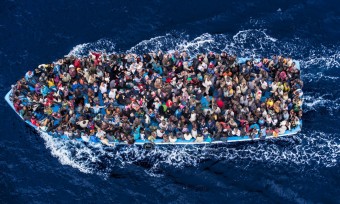
Posted in Miscellaneous,Philosophy,ReadingsNovember 26, 2013
Definition of sapiosexuality :
(sā-pē-ō-sĕk-shü-ăl'ĭ-tē)
1. (n.) A behavior of becoming attracted to or aroused by intelligence and its use.
Origins: From the Latin root sapien, wise or intelligent, and Latin sexualis, relating to the sexes.
Example: Me? I don't care too much about the looks. I want an incisive, inquisitive, insightful, irreverent mind. I want someone for whom philosophical discussion is foreplay. I want someone who sometimes makes me go ouch due to their wit and evil sense of humor. I want someone that I can reach out and touch randomly. I want someone I can cuddle with. I decided this all means that I am sapiosexual.

Posted in Miscellaneous,Writings,أنسي الحاجNovember 20, 2013
طوال السنوات الماضية و أنا زائر منتظم لمعارض الكتاب في عدة مدن و بلدان منها القاهرة وأبوظبي والشارقة….الخ . وعادة ما تقدم تلك المعارض خدمة الاستفسار عن كتاب سواء عن طريق اسم الكاتب أو عنوان الكتاب لتسهيل الحصول على الكتاب من خلال الخدمة الالكترونية. في كل مرة أقترح اسم الأستاذ أنسي الحاج أو اسم أحد مؤلفاته فلا أجد أي مؤلَف أو ذكر لأنسي الحاج، ليأتي جواب موظف الخدمة : عذرا لا وجود لإسم المؤلف أو الكتاب!
خلال معرض الكتاب الأخير في الشارقة والذي زاره أكثر من مليون زائر بحسب إحصائيات القائمين على المعرض، سألت أصدقائي المسؤولين عن دور النشر عن سبب غياب اسم كبير مثل أنسي الحاج عن المعارض ، معظمهم أخبرني أن الأستاذ ينشر من خلال دار الجديد، وهذه الأخيرة لا تحضر معارض الكتاب.
لا أعرف من هو ناشر كتب الأستاذ، لكن ما أعرفه جيدا أنني لم أصدف دار الجديد في أي معرض من معارض الكتب التي زرتها، اللهما إلا معرض بيروت الذي لم أزره بعد!

Posted in Philosophy,Poetry,QuotesNovember 4, 2013
وقال النفري: (الصبر من السكينة والحلم من الصبر والرفق من الحلم) .
- وعن الحسن قال: (المؤمن حليمٌ لا يجهل وإن جُهِل عليه، حليمٌ لا يظلم، وإن ظُلِم غَفَر، لا يقطع، وإن قُطِع وصل، لا يبخل، وإن بُخلِ عليه صبر) .

Posted in ReadingsApril 7, 2013
New America Media ,
Op-ed, Ghassan Michel Rubeiz ,
Posted: April 5, 2013
Editor's Note: By the time Assad is deposed, the Syrian state might well disappear, argues commentator Ghassan Michel Rubeiz. Rubeiz, a social scientist and political commentator, is the former secretary of the Middle East for the Geneva-based World Council of Churches.
To save Syria’s sovereignty and avert wider regional instability, rebel forces should be urged to negotiate with the ruling regime of President Bashar al Assad. Serious political reform cannot be achieved on the battlefield of an escalating, sectarian civil war.
Washington’s siding with the rebels as it passively promotes the forceful removal of Assad has not worked out. By the time Assad is deposed, the Syrian state as we know it might well disappear.
Washington should discourage Saudi Arabia and Qatar from taking the lead in planning for the future of Syria. Moreover, Moscow must push Assad to accept radical reforms. Increased pressure, meanwhile, should be brought to bear on both the opposition and the regime toward achieving a settlement.
It is not inconceivable that under such an agreement, Assad could eventually be eased out nonviolently; he may already be considering ways to avoid facing the moral and practical implications of rebuilding a country destroyed on his watch. Even supporters of the regime would not want to keep Assad on the throne under such terms.
The cost of the status quo is too high. The war has already claimed more than 80,000 lives and displaced upwards of five million. Its effects are being felt beyond the country’s borders in Lebanon, Jordan and Iraq, not to mention Turkey and Israel, where the latest flare up with Palestinians is being partially blamed on the Syrian crisis.
In Lebanon, the half million Syrian refugees that have crossed into the country have added to an equal number of Palestinian refugees already there. Together, these two groups comprise a quarter of Lebanon’s entire population. In Jordan, Syrian refugees are upending demographics in the kingdom and adding to its instability.
It is also clear that neither side in the conflict is capable on its own of achieving a decisive military victory. While the uprising has lately scored small victories, government forces maintain dominant air power and the support of a significant part of the population.
The lingering stalemate, meanwhile, is beginning to take on a Cold War dynamic. In Damascus, Bashar al-Assad relies on Iran for military assistance and on Russia for political support. The Lebanese Hezbollah militia supports the Syrian regime by fighting the rebels inside Syria.
The opposition, meanwhile, depends largely on Saudi Arabia and Qatar for material, military and political aid. The United States and some European countries offer the rebels material assistance and diplomatic guidance, while Washington coordinates with Jordan and Israel to orchestrate an outcome favorable to their interests. The United States is also training Syrian rebels in Jordan.
Equally as troubling and in an echo of events in Libya, rebel forces in Syria have been infiltrated by a massive entry of foreign fighters financed largely by Arab donors. Their aim of establishing some form of post-Assad political stability is nothing but a mirage, a fact amply demonstrated by the outcomes in states swept up in the events of the Arab Spring. Any meaningful solution in Syria and these other nations will not come about without first integrating deep political and societal change.
More to the point, in Syria the outcome of sectarian civil war is sectarian state building.
Barring negotiations, the violence will likely continue to tear at the national fabric of what had long been a largely secular society. Sectarian killings, such as those increasingly seen in Iraq, are becoming more frequent.
Amid such violent devolution, fissures are erupting as ethnic groups begin to retrench. The ethnic Druze may be forced southward, near the Israeli occupied Golan Heights. The Alawites — to which the Assad family belongs – will look to retreat to their coastal district in the West. The three million Kurds in the northeast, the only group that aspires to “liberation” from the state in a post-Assad era, could exploit the deepening political vacuum by separating to form a “Syrian Kurdistan.”
The majority Sunnis — who form the bulk of the opposition — could end up occupying the central and larger part of the country. Their ranks are far from unified, though, as secular (nationalist and Ba’athist) and religious (Salafi and the Muslim Brotherhood) vie for control.
Negotiation between the opposition and the Assad government is the only viable means of stopping the bloodshed, preserving the nation’s sovereignty, and containing the sectarian tension.
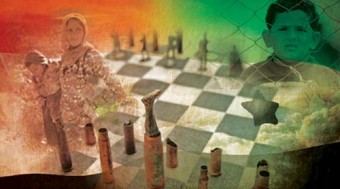
Posted in أنسي الحاجMarch 4, 2013
العاجز عن الحبّ قد يعوّض بالحريّة، وهي بالفعل تُعوَّض، ولكنْ كمَن يهرب من مرآةٍ إلى مرآة ولا يرى إلّا الصورة التي أراد أن يتجنّبها. الحريّة أريَحُ من الحبّ، راحة الهائم الخاوي، ولكنْ إلى متى؟ هل يكتفي الهواء بأن يكون هواءً في مدى بلا بحر ولا نهر ولا شجر ولا كائنات؟ مَن يداعب عندئذٍ، مَن يلاعب، مَن يُحرّك، كيف يشعر بوجود نفسه؟ قد يلعب الهواء مع نفسه ليلتهي، كما يفعل النرجسي، لكن النرجسي بحاجة، ولو بين الحين والحين، إلى حطبٍ لمدخنته، إلى معجبٍ يلقم إعجابه بنفسه، يُجدّد نظرته العاشقة لنفسه، وإلّا جفّ وتفكَّكَ من الرتابة. الحريّة غير المتلاطمة العواطف، غير المسكونة إلّا بصاحبها، عُنوسٌ عنكبوتيّ حزين.
والهواء وحيداً يختنق.

Posted in أدونيسFebruary 28, 2013
عن الحياة
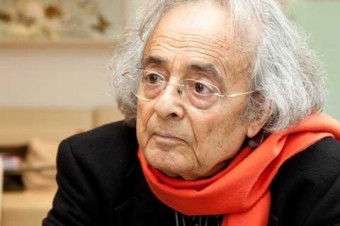
Posted in Readings,أنسي الحاجFebruary 28, 2013

Posted in أدونيسFebruary 12, 2013
أيتها الصديقات، أيها الأصدقاء نجتمع من أجل ” سورية ديمقراطيّة “، ومن أجل ” دولة مدنيّة ” فيها، وفقاً لموضوع هذا المؤتمر. السؤال المباشر الذي يفرض نفسه، في هذا الصّدد، هو: هل نؤمن جميعاً أنّ الوسيلة جزء لا يتجزّأ من الغاية؟ إذا كان الجواب بالإيجاب، وهو ما أفترضه شخصيّاً، فإنّ علينا، أن نعترف بأنّ الوسائل العنفيّة المسلّحة القائمة، اليوم، إنّما هي وسائل تتناقض كلّيّاً وجوهريّاً مع هذه الغاية. إنّها بالأحرى، قضاءٌ على الديمقراطيّة والمدنيّة، عدا أنها لا تقيم أيّ وزن لحياة الإنسان ولحقوقه وحرّياته، إضافةً إلى أنها تحتقر تاريخه ومنجزاته العمرانيّة والحضاريّة. والحقّ أننا عندما ننظر إلى ما يحدث الآن في سورية، مربوطاً برمزيّتها التاريخيّة، على المستويين الحضاري والكونيّ، ندرك مباشرةً كيف أنّ الصراع فيها تحوّل إلى صراعٍ إقليميّ ودوليّ في آن، وكأنّ مقصد الجميع يتخطّى تهديم النّظام إلى تهديم سوريّة.
